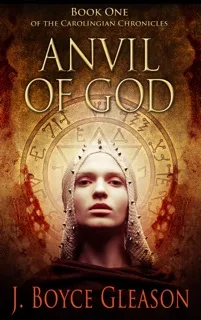ANVIL OF GOD is a desperately intense tale of the Dark Ages, where people lived by the law of the sword
J.Boyce Gleason’s ANVIL OF GOD, Book One of the
Carolingian Chronicles, is a desperately intense tale of the Dark Ages, where
people lived by the law of the sword
I grew up on Elizabeth Captive Princess but the
genre of historical fiction, with the exception of Wolf Hall, has often seemed
stilted to me in terms of emotional logic. ANVIL OF GOD is a happy discovery.
J.Boyce Gleason creates a world of warring Christians and Pagans with great emotional
sense. The motivations of the characters and the beliefs that shape their actions,
are completely convincing and emotionally very intense. Boyce’s pagan world derives
from Norse mythology and the rituals described are visceral, more about the
aesthetics of sensual human interaction than supernatural, but he leaves that
question open.
The story is based on the history of Charles “the
Hammer” Martel, Mayor of the Palace
to the Merovingian kings. The scant facts leave a lot of room for
invention. Martel was a warlord, who saved
Christianity by fighting the Saracens, who had spread from North Africa to
France. He used his sword, and an alliance with the Church, to fight his way
through France and Germany, which he unified. Charles married a Bavarian
princess, whose uncle was a pagan Bavaria. He unified Europe under his
authority, but died before he could take the throne. With his death, the three
sons warred over territory and succession. The two eldest fought pagan rebels
in the East, including their sister, who defied her father to marry a rebel lord. The person held responsible for this was
Sunnichild, Martel’s wife.
Boyce fills-in the blanks. ANVIL OF GOD begins in 741
with Sunnichild, the closet pagan, waiting for the return of her lord. Sunni
loves Charles but is shrewd enough to eavesdrop on his conversation with his Church
advisor, Boniface, and Carloman, his eldest son. It’s a matter of insurance. Though
Sunni managed affairs of state while her husband was away and could predict his
stance on issues, she needs to know what was on the table. At stake is the
future of her son Gripho, an arrogant impulsive boy of 14. Sunni’s concern is practical. Carloman, unlike
his father who used the Church, is so devout he’s controlled by Boniface.
When Sunni learns Charles is dying, she prepares herself
for what must come. When Charles announces his succession plan to divide the
kingdom among his three sons, with the choice middle territory for Gripho, neither
Carloman and Pippin, the adult sons, nor the lords Charles asks for loyalty,
are happy. After the funeral, Sunni leaves for the safety of Laon in France. Though Charles didn’t persecute pagans, she
fears Carloman will not be so lenient. Her secret weapon is Charles’ 18 year
old daughter, Hiltrude. Trained as a
warrior and equal to men, Trudi, seeks out Sunni in despair over her father’s
intention to marry her off for political advantage. Sunni helps her by teaching
her lore to prepare for a ritual of female sexual power. Later, Trudi flees the
palace to avoid a forced marriage.
The women in ANVIL OF GOD are strong behind the
scenes forces, with chapters alternating between Trudi’s journey and the frenzied
fighting, as Carloman lays siege to the castle, where Sunni found refuge,
Pippin seeks escape for her and Gripho and a cessation of Carloman’s slaughter,
and Gripho sabotages himself, piling up ill-considered deeds. The pace is
intense and desperate and the outcome uncertain. In this epic tale, the
characters of each brother, and how their beliefs influence them, have huge
consequences for themselves and the people of their father’s empire. And, in the end, Trudi, grows larger than life.
Like a Norse Goddess, she fights a horrendous battle worthy of the legendary
Charles, The Hammer. I cannot wait to
pick up this epic in Volume Two of the Carolingian Chronicles. Sample chapters at:
AnvilofGod.com
AnvilofGod.com



Comments
Post a Comment